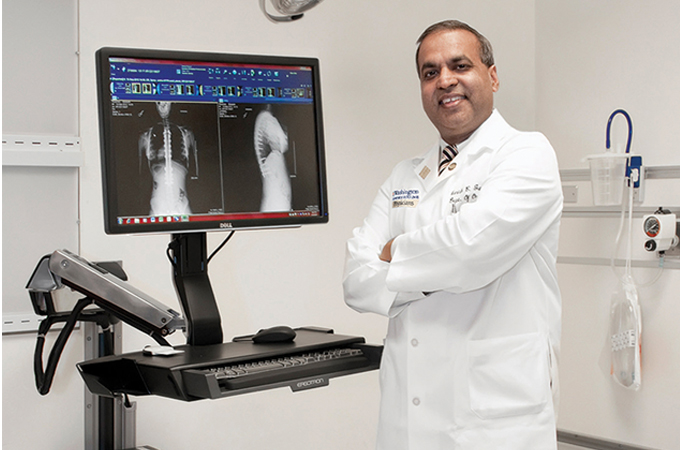Name: Dr. Munish Gupta, Mildred B. Simon Distinguished Professor of Orthopaedic Surgery and Chief of Spine Surgery in the Department of Orthopedic Surgery at Washington University School of Medicine
Focus: Dr. Gupta specializes in adult and pediatric spine surgery, with a focus on complex spinal reconstructive surgery for the treatment of all spinal deformities, including scoliosis. He came to St. Louis from the UC Davis School of Medicine Spine Center in Davis, California, and practices at Barnes-Jewish Hospital, St. Louis Children’s Hospital and Shriners Hospitals for Children–St. Louis.
Medical advances: Gupta created the pedicle subtraction osteotomy, an improved technique to fix severe spine deformities. His research on spinal fusion technologies aims to make surgery safer and more efficient. He also is working on a model for degenerative disc disease.
Education: Received his medical degree from Northwestern University. He completed his orthopedic surgery residency at Northwestern Memorial Hospital in Chicago and a spine surgery fellowship at the Kenton D. Leatherman Spine Center and University of Louisville.
Family: Wife Dr. Bela Mehra practices internal medicine. Their three children are studying medicine at George Washington University.
Q&A:
Why Washington University: It’s a top program in spine surgery, active in research with access to many resources. There’s also great synergy and a high level of collaboration between colleagues and departments.
Thorough expertise: I have experience treating both adults and pediatrics, which gives me a unique perspective. I understand the importance of timing and place great consideration on a patient’s age and future aspirations when determining treatment for a spinal deformity such as scoliosis. If I see a 16-year-old girl who wants to be an athlete but has a 40-degree curve, I know we can fix her spine at a later date without grave consequences. If we fuse her spine earlier, it may ruin her dreams.
Improving care: I want to set up a comprehensive spine center at Washington University that provides total spine care. I did this at UC Davis, and it vastly improved patient care. It means primary care doctors can send patients to the multidisciplinary spine institute and know they will be taken care of.
Why orthopedics: I had a mentor early on who was an orthopedic hand surgeon and inspired me to go into orthopedics. When I was a resident, there was a doctor who introduced me to spine surgery and I found it to be a challenging subdivision of orthopedics. The variety in operations and techniques keeps it exciting.
Job rewards: The best part is helping a patient who has a deformity and is in a lot of pain, and then fixing it for them. That is what’s most satisfying.
Photo courtesy of Julie Serat
